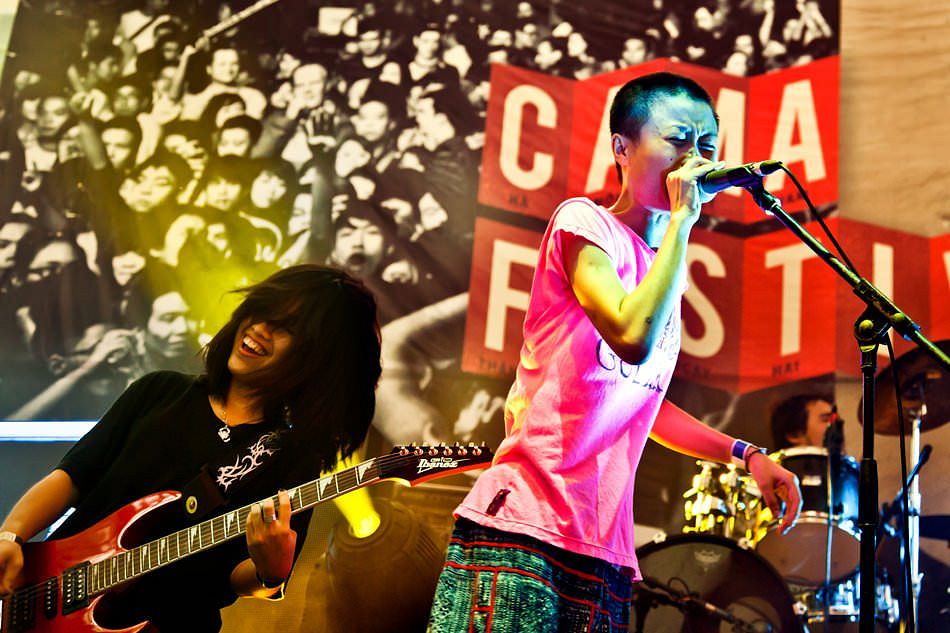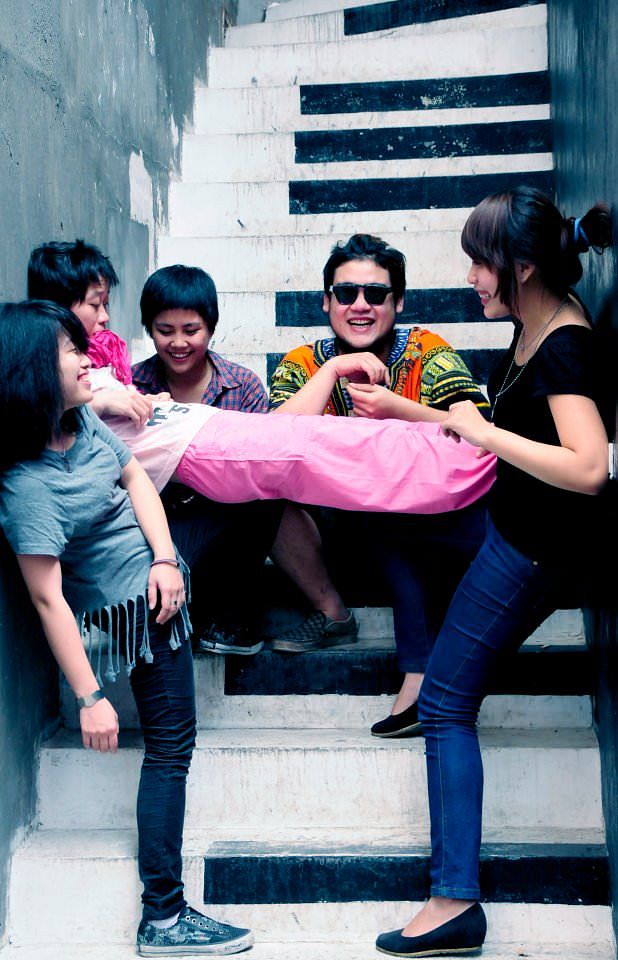In an example of cruel irony, October 20 is when we celebrate annual Vietnam Women's Day, and also the anniversary of the passing of Mai Nga (commonly known as Nga Nhí), the lead singer of Gỗ Lim — a Hanoi-based female post-punk band that, albeit short-lived, struck a blow for women’s representation in rock and metal music in Vietnam in 2011 and 2012.
It was only until a few days after Nga Nhí's death in 2012 that I first started listening to Gỗ Lim’s music, despite having been a fan of the underground rock and metal music scene for quite awhile. Every rock concert I went to at the time consisted of crowds of men in black band T-shirts headbanging to similarly attired and gendered musicians.
My first impression of Gỗ Lim was on a YouTube thumbnail showing Nga Nhí in a pink tee on the stage of CAMA (Club for the Appreciation of Music and Art) Festival. It immediately disrupted my visual perception of the genre. I wish I had a more interesting story to tell about the first Gỗ Lim song I ever heard, but I'm sure it was the one that comes up first in YouTube's algorithm-driven search results, their most popular, 'Các Bạn Đứng Nghiêm'. The song takes the perspective of a giám thị (school disciplinary master), throwing orders at students to make them stay in line, not to move, and not to laugh.
'Các Bạn Đứng Nghiêm' is a song at conflict with itself. The funky bassline, heavy guitar riffs, and drums instruct you to dance, while Nga's scream instructs you not to. The song struck a chord with any Vietnamese person who ever attended public school and likely had their own giám thị encounter. Its playful proposition produced laughter, which was at the heart of Gỗ Lim's subversive power.

Nga Nhí on the stage of CAMA Festival. Photo by Lizo Glennard.
The band originally formed as Golem, and had an alternative rock sound and identity. They performed covers of 'Zombie' and 'Animal Instinct' by The Cranberries, as well as some original songs.
Nga Nhí joined the band in 2011 and Golem become Gỗ Lim. The full lineup consisted of Nga Nhí on vocals, Trang Chuối and La Sim on guitar, Nghĩa Bờm on percussion, and Hà My on bass. They described themselves as “punk pussies and beard,” with the “beard” referring to the band's lone male Nghĩa, Nga’s brother. Their style evolved too — the sounds became heavier and edgier as influenced by punk rock and riot grrrl, while the lyrics became more casual and playful. Gỗ Lim’s only album, 'Gái Làng' (Village Girl), was released in October 2015 as a tribute to Nga Nhí.
Describing their music in an interview, the band noted: “There are no restriction in terms of what topic goes into our songs, we talk about what we’ve seen and want to express: from school kids having to stay in line to girls doing their hair, even a cat, our favorite pet, being hungry, gets a song. Our music is open-minded, easy-going, oftentimes very grungy because we play what we like to play. We believe in the freedom of individual’s expression.”


Photos via Gỗ Lim's Facebook page.
Gỗ Lim’s performances expanded from local gigs in Hanoi music venues like Hanoi Rock City to international events. In March 2012, Gỗ Lim opened for MEN, a radical art project that featured JD Samson and Johanna Fateman, two legendary gender-smashing icons best known for their involvement with Le Tigre, one of the pioneer punk band of the riot grrrl movement. Later that year, they played CAMA Festival alongside Chinese indie sensation Carsick Cars, Japanese punk rock band Electric Eel Shock, and Philippines’s electronic rock pioneer Turbo Goth.
While the messages of many riot grrrl bands are in-your-face, straightforward and hard-hitting, Gỗ Lim’s lyrics take a more ambiguous, humorous, and playful approach, while still keeping the genre's defiant spirit intact. This quality reflects many feminist and queer scholars theories about the subversive potential of humor and serious play. Philosopher Judith Butler contended in her preface for Gender Trouble that “laughter in the face of serious categories is indispensable for feminism.” Playful acts serving a cause work as powerful tools to denaturalize norms, thus inviting alternatives and open-mindedness.
Take the first two sentences from 'Các Bạn Đứng Nghiêm':
Kìa em bé gái, kìa em bé trai, em đứng sang phải, em đứng sang trái! Mau lên! / Này em bé trái, này em bé gai, em rơi trong rọ, em rơi trong rọ rồi. Em ơi!
Hey little girl, hey little boy, move to the right, move to the left! Quick! / Hey little left, hey little spike, you fell into the trap, you fell into the trap, hey you!
In the first sentence, two pairs of binary gái / trai (girl / boy), and phải / trái (right / left) are used. Then, in the second sentence, using spoonerism, gái / trai becomes trái / gai (left / spike), which is no longer a dichotomy, and when put beside em bé (kid), makes absolutely no sense. This toying with pairs directly questions the legitimacy of binary gender classifications.
Gỗ Lim's wrestling with stereotypical gender notions can also be spotted in 'Người Đàn Bà Làm Đầu' (The Woman Does Her Hair), which starts off with a list of nouns and adjectives depicting women's hairstyles. The lyrics' female figures have hairdos that are not traditionally seen as feminine such as húi cua (crew cut), dreadlocks, siêu hói (super bald), nát xơ (crushed and dry), uốn hôi (stinky).
Dissecting Gỗ Lim’s lyrics is a fascinating exercise. The band blends extensive malapropisms, alliterations, and onomatopoeia with creative wordplay. The band often sprinkles in their own invented phrases as well. For example, the chorus of 'Người Đàn Bà Làm Đầu' is a rapid-fire string of phrases formed by rearranging the titles five words. The result is phrases like người đàn bà làm tình (the woman make love), người làm tình đàn bà (those who make love to the woman), and người làm tình cụt đầu (others make love without their head).
Art enthusiasts might interpret Gỗ Lim's small acts of defiance against language as a nod to Dadaism. The anti-art art movement first started in 20th century Europe, and one of its core premises was to abolish reason and logic to strike against the rationalizations of modern capitalist society. Dadaists opt for a nonsensical and irrational approach in their work; even the word "dada" itself means nothing. In the words of the poet Tristan Tzara, which excellently captures the heart of Gỗ Lim's music: "Freedom: Dada Dada Dada, a roaring of tense colors, and interlacing of opposites and of all contradictions, grotesques, inconsistencies: LIFE."
This article was first published in 2018.


















